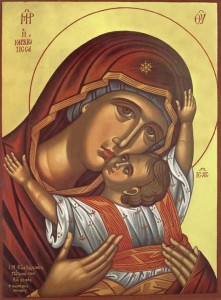 I recently had a conversation with a Christian on Facebook regarding some of the passages in the Bible that refer to Mary. During the conversation, I referred to Mary as The Mother of God (Theotokos). This brought a rather stern reaction from him. He stated, “Mary isn’t the Mother of God. God is not born or created. That’s heresy. Mary is the mother of Jesus’ flesh of his human body, not of His Divinity, which already existed before Mary was born.” While I can understand his concerns, I wonder if this gentleman realizes that his position was thoroughly discussed, analyzed, and subsequently rejected by the Church roughly 1600 years ago.
I recently had a conversation with a Christian on Facebook regarding some of the passages in the Bible that refer to Mary. During the conversation, I referred to Mary as The Mother of God (Theotokos). This brought a rather stern reaction from him. He stated, “Mary isn’t the Mother of God. God is not born or created. That’s heresy. Mary is the mother of Jesus’ flesh of his human body, not of His Divinity, which already existed before Mary was born.” While I can understand his concerns, I wonder if this gentleman realizes that his position was thoroughly discussed, analyzed, and subsequently rejected by the Church roughly 1600 years ago.
During the first 500 years of Christianity, the Church dealt with the rise of several Christological heresies that necessitated the formulation of a clear theological expression of Christ’s Person and Nature. In the early fifth century, one of these heresies questioned how Christ’s two natures, that of God and Man, related to one another. Following the teachings of Theodore of Mopsuestia, Nestorius, Patriarch of Constantinople, taught that Christ’s nature as God was utterly separate from His nature as man. In this understanding, Christ’s early life was that of a human being in contact with God. God foresaw that Christ would lead a virtuous life and chose Him to be a vessel of divinity. At Christ’s birth, his contact with divinity was incomplete, becoming so later in His life. Nestorius preferred the term Christotokos (Mother of Christ) to that already accepted as part of Holy Tradition, Theotokos (Mother of God), for He believed that Mary’s baby was not fully divine.
This teaching, which came to be known as Nestorianism, led to the calling of the Third Ecumenical Council in 431 AD. In this Council, the Fathers of the Church upheld the teaching that in Christ the dual natures of divinity and humanity do not merely come in contact with one another, but that they are, rather, in union. At the Incarnation, the Second Person of the Trinity, Christ, took on human nature, adding it to His Person, while at the same time retaining the fullness of His Divinity. At the birth of Christ, Mary gave birth to a baby who was both God and human, each in the fullest sense of the word. As a result, to deny that Mary was the Mother of God is to deny the full reality of the Incarnation and its resulting efficacy in our salvation.
In a letter to John of Antioch in 433 AD, Saint Cyril summed up this aspect of Christology very well.
Thus we confess that our Lord Jesus Christ, the only-begotten Son of God, is perfect God and perfect man, consisting of a rational soul and body, that he was begotten from the Father before all ages according to the Divinity, and that in these latter times was begotten for us and for our salvation from the Virgin Mary; that he is consubstantial with the Father in his Divinity and consubstantial with us in his humanity, for in him there was accomplished the unity of two natures. Therefore we acknowledge one Christ, one Son, one Lord. On the basis of this union without confusion, we confess the Most Holy Virgin to be the Mother of God because God the Word was incarnate and became man and in the conception itself united with himself the temple received from her. . . God the Word came down from heaven and, taking the form of a servant, emptied himself, and was called the Son of man, remaining that which he is – God.
The title Mother of God is a confession about Christ. As I have heard said in the past, it says more about Him than it does about Mary.